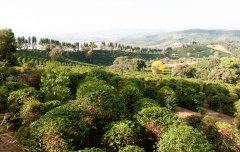Guatemala coffee beans cultivation production process Inkert estate coffee washing processing and historical stories
Jes ú s Aguirre Panam á was the first owner of the Incht farm, which is now managed by the third and fourth generations of the Aguirre family, who have been working on the farm since 1956, when they produced about three hundred bags of parchment coffee. Now, they work with a great team and share the same mission to produce boutique coffee; maintain environmentally friendly agricultural practices and focus on corporate social responsibility to achieve new farm management practices that are economically feasible for all parties concerned.
Around 1900, he began to grow and produce coffee and called the farm EL INJERTO because "injerto" was the name of the fruit native to the area. El Injerto coffee is the most authentic expression of its local characteristics, characterized by the local climate and soil properties. Respecting and understanding the origin of our varieties is a prerequisite to guide our coffee process. Our coffee clearly expresses the combination of genes and soil. Produce and process coffee beans on the basis of respect for the environment, people and nearby communities
The farm plantation is located in the Huehuetenango Heights, near the famous Sierra de los Cuchumatanes, stretching from 1500 Masr (Haibami) to 1920 Masr above sea level, where the most exotic and exotic varieties are planted. El Injerto has a mineral-rich non-volcanic soil with an average precipitation of 1600 mm and a temperature of 22 °C, so it has the best microclimate for producing boutique coffee.
After all, over the years, they specialize in producing high-quality coffee. In order to be able to do this, they have invested heavily in research, technology and education. Different tree species (Inga spp.;Gravillearobusta and Macadamia integrifolia) and canopy are used for shade throughout the plantation.
Here are the varieties of Incht Manor that are now produced, some of which are still being tested:
Bourbon
Roho
Red card tuai
Pakamara
Katuai Amarero
Marago Gippe
Geisha Panama
Geisha Malawi
SL 28
Mocha
Water washing
Coffee seeds are picked by hand, picking only the coffee beans that reach the best maturity. The defective beans are separated in the water tank. Remove the pulp or pulp of coffee beans every day. Then bring the coffee to a special pot lined with glazed tiles and wait for the time it takes to get the natural fermentation point.
Then wash the coffee beans with natural water, soak the coffee in clear water for 24 hours, and then enter the courtyard for pre-drying.
Dry method
Also known as the natural process, this process is new to Guatemalan farmers and is not new at all in other parts of the world, such as Africa and Brazil. After the floating object is removed, the carefully selected beans are dried directly in the terrace or African bed to get a beautiful and clean cup.
This process gives a strong fruity, very sweet and thick body. Some varieties are more suitable for this process than others.
Dry grinding
EL INJERTO has special equipment to convert parchment coffee into raw coffee. This process allows coffee to be exported directly to other countries. In the transition from parchment to raw coffee, coffee goes through different machines to make a special classification of weight, size and density. After that, the coffee is tasted for the last time, thus completing the strict quality control from the seed to the export of raw coffee.
Important Notice :
前街咖啡 FrontStreet Coffee has moved to new addredd:
FrontStreet Coffee Address: 315,Donghua East Road,GuangZhou
Tel:020 38364473
- Prev

Panamanian champion coffee bean picking time processing method Catova Coffee Family Story
A century-old monument treatment site surrounded by mountains. Katowa is the meaning of the local language mountains. Katowa in Ricardo has a total of four manor groups, mainly growing Katula and Tippika varieties. The complex and multi-level flavor can be obtained by planting these two varieties in the high altitude area of more than 1 600 meters in this area. Katowa is famous for its two great estates, one as Katova. Tang he (Kotowa Don K)
- Next

Brazil COE Cup Coffee often wins Sentain Manor Historical Story characteristics of Brazilian Coffee Bean Flavor
Santa Ins is part of the Serto Group, which, in addition to 75 hectares of coffee, also owns 140 hectares of native forest and grazes their Giorando cattle. Francesco Isidrodias Pereira (Francisco Isidro Dias Pereira) grows five varieties of coffee on the farm: yellow bourbon, red bourbon, yellow Katui, Brazilian berries and New World.
Related
- Detailed explanation of Jadeite planting Land in Panamanian Jadeite Manor introduction to the grading system of Jadeite competitive bidding, Red bid, Green bid and Rose Summer
- Story of Coffee planting in Brenka region of Costa Rica Stonehenge Manor anaerobic heavy honey treatment of flavor mouth
- What's on the barrel of Blue Mountain Coffee beans?
- Can American coffee also pull flowers? How to use hot American style to pull out a good-looking pattern?
- Can you make a cold extract with coffee beans? What is the right proportion for cold-extracted coffee formula?
- Indonesian PWN Gold Mandrine Coffee Origin Features Flavor How to Chong? Mandolin coffee is American.
- A brief introduction to the flavor characteristics of Brazilian yellow bourbon coffee beans
- What is the effect of different water quality on the flavor of cold-extracted coffee? What kind of water is best for brewing coffee?
- Why do you think of Rose Summer whenever you mention Panamanian coffee?
- Introduction to the characteristics of authentic blue mountain coffee bean producing areas? What is the CIB Coffee Authority in Jamaica?

